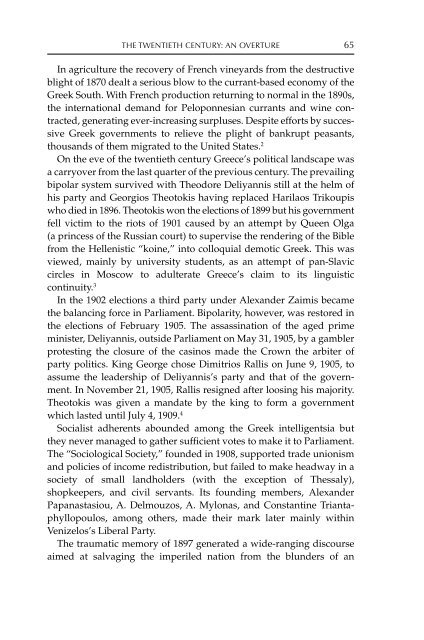MODERN GREECE: A History since 1821 - Amazon Web Services
MODERN GREECE: A History since 1821 - Amazon Web Services
MODERN GREECE: A History since 1821 - Amazon Web Services
You also want an ePaper? Increase the reach of your titles
YUMPU automatically turns print PDFs into web optimized ePapers that Google loves.
THE TWENTIETH CENTURY: AN OVERTURE 65<br />
In agriculture the recovery of French vineyards from the destructive<br />
blight of 1870 dealt a serious blow to the currant-based economy of the<br />
Greek South. With French production returning to normal in the 1890s,<br />
the international demand for Peloponnesian currants and wine contracted,<br />
generating ever-increasing surpluses. Despite efforts by successive<br />
Greek governments to relieve the plight of bankrupt peasants,<br />
thousands of them migrated to the United States. 2<br />
On the eve of the twentieth century Greece’s political landscape was<br />
a carryover from the last quarter of the previous century. The prevailing<br />
bipolar system survived with Theodore Deliyannis still at the helm of<br />
his party and Georgios Theotokis having replaced Harilaos Trikoupis<br />
who died in 1896. Theotokis won the elections of 1899 but his government<br />
fell victim to the riots of 1901 caused by an attempt by Queen Olga<br />
(a princess of the Russian court) to supervise the rendering of the Bible<br />
from the Hellenistic “koine,” into colloquial demotic Greek. This was<br />
viewed, mainly by university students, as an attempt of pan-Slavic<br />
circles in Moscow to adulterate Greece’s claim to its linguistic<br />
continuity. 3<br />
In the 1902 elections a third party under Alexander Zaimis became<br />
the balancing force in Parliament. Bipolarity, however, was restored in<br />
the elections of February 1905. The assassination of the aged prime<br />
minister, Deliyannis, outside Parliament on May 31, 1905, by a gambler<br />
protesting the closure of the casinos made the Crown the arbiter of<br />
party politics. King George chose Dimitrios Rallis on June 9, 1905, to<br />
assume the leadership of Deliyannis’s party and that of the government.<br />
In November 21, 1905, Rallis resigned after loosing his majority.<br />
Theotokis was given a mandate by the king to form a government<br />
which lasted until July 4, 1909. 4<br />
Socialist adherents abounded among the Greek intelligentsia but<br />
they never managed to gather sufficient votes to make it to Parliament.<br />
The “Sociological Society,” founded in 1908, supported trade unionism<br />
and policies of income redistribution, but failed to make headway in a<br />
society of small landholders (with the exception of Thessaly),<br />
shopkeepers, and civil servants. Its founding members, Alexander<br />
Papanastasiou, A. Delmouzos, A. Mylonas, and Constantine Triantaphyllopoulos,<br />
among others, made their mark later mainly within<br />
Venizelos’s Liberal Party.<br />
The traumatic memory of 1897 generated a wide-ranging discourse<br />
aimed at salvaging the imperiled nation from the blunders of an


